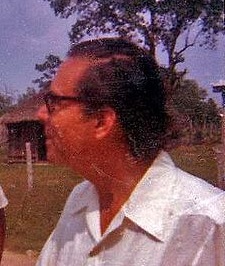| |||||||||||||||||||||||||||||||||||||||||||||||||
All 9 seats in the British Honduras Legislative Assembly | |||||||||||||||||||||||||||||||||||||||||||||||||
|---|---|---|---|---|---|---|---|---|---|---|---|---|---|---|---|---|---|---|---|---|---|---|---|---|---|---|---|---|---|---|---|---|---|---|---|---|---|---|---|---|---|---|---|---|---|---|---|---|---|
| |||||||||||||||||||||||||||||||||||||||||||||||||
| |||||||||||||||||||||||||||||||||||||||||||||||||
 |
|---|
| This article is part of a series on the politics and government of Belize |
Monarchy |
Administrative divisions |
A legislative election was held in British Honduras on 20 March 1957.

British Honduras was a British Crown colony on the east coast of Central America, south of Mexico, from 1862 to 1964, then a self-governing colony, renamed Belize in June 1973, until September 1981, when it gained full independence as Belize. British Honduras was the last continental possession of the United Kingdom in the Americas.
The ruling People's United Party won all nine seats contested. [2] This was the first of two occasions they would sweep the House. It was the PUP's first election under the leadership of George Cadle Price. Price would lead the party until 1996.

The People's United Party (PUP) is one of two major political parties in Belize. It is currently the main opposition party with 12 of 31 seats in the House of Representatives. It is a centre-left Christian democratic party. The party leader is Johnny Briceño, who currently serves as Belize's Leader of the Opposition.

George Cadle Price, PC, OCC, was a Belizean statesman who served twice as the head of government of Belize from 1961–1984 and 1989–1993. He served as First Minister and Premier under British rule until independence in 1981 and was the nation's first prime minister after independence that year. He is considered to have been one of the principal architects of Belizean independence. Today he is referred to by many as the "Father of the Nation". Price effectively dominated Belizean politics from the early 1960s until his 1996 retirement from party leadership, serving as the nation's head of government under various titles for most of that period.
The Honduran Independence Party (HIP), a forerunner of the modern United Democratic Party, was founded the previous year by an anti-Price faction within the PUP led by former PUP leader Leigh Richardson. The party fielded five out of a possible nine candidates, but failed to win any seats. [2]
The Honduran Independence Party was a short-lived 1950s political party that was essentially a splinter group of the People's United Party (PUP).

The United Democratic Party (UDP) is one of the two major political parties in Belize. It is the ruling party, having won the 2008, 2012 and 2015 general elections. A centre-right conservative party, the UDP is led by Prime Minister of Belize Dean Barrow.
Leigh Richardson was a Honduran-born Belizean politician. Richardson served as the leader of the People's United Party in the 1950s, and also as mayor of Belize City.
The election was the last for the pro-colonial National Party. Charles Westby, the NP's only successful candidate in the 1954 election, ran as an independent. [2] The HIP and NP merged in 1958 to form the National Independence Party.
The National Party of Belize (NP) was a political party established mainly to fight the anti-colonialist movement propagated by the People's United Party (PUP). It had only minimal success and was eventually deregistered.
An independent or nonpartisan politician is an individual politician not affiliated with any political party. There are numerous reasons why someone may stand for office as an independent.
The National Independence Party of Belize was a merger of two Belizean political parties that effectively served as the chief opposition party in Belize for practically all of its existence. It was formed in July 1958 and dissolved as part of the formation of the new United Democratic Party in 1973.
| Parties | Votes | % | Seats |
|---|---|---|---|
| People's United Party | 6,876 | 61.32 | 9 |
| Honduran Independence Party | 2,057 | 18.34 | - |
| National Party | 1,449 | 12.92 | - |
| Independents | 832 | 7.42 | - |
| Total valid votes | 11,214 | 100.00 | 9 |
| Invalid votes | 420 | ||
| Total votes cast (turnout: 52.7%) | 11,634 | ||
| Registered voters | 22,058 | ||






